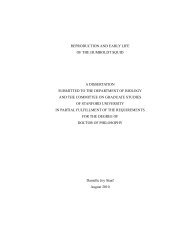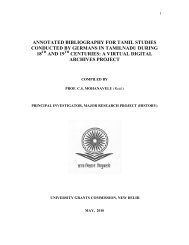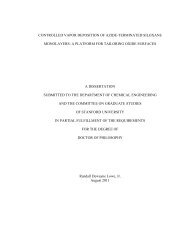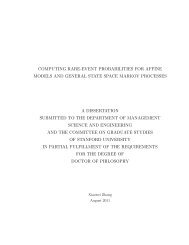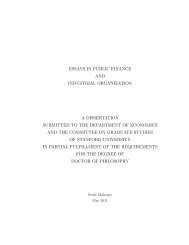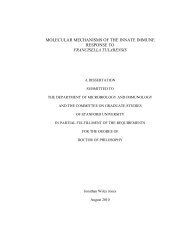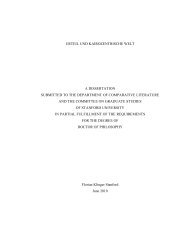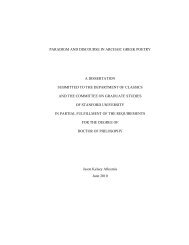- Page 1 and 2: DE LA HETAERA A LA RAMERA: EL VIAJE
- Page 3 and 4: I certify that I have read this dis
- Page 5 and 6: corporizar un amplio rango de signi
- Page 7 and 8: Agradecimientos Deseo Agradecer el
- Page 9 and 10: Introducción La prostituta constit
- Page 11 and 12: necesarias que le permitan trascend
- Page 13 and 14: La hierodule enviada con el cazador
- Page 15 and 16: (Citado en Qualls-Corbett 24-25) La
- Page 17 and 18: único significante grupo de mujere
- Page 19 and 20: femeninas de la población nativa.
- Page 21 and 22: hermenéutica, aunque la palabra pa
- Page 23 and 24: en torno a 510 a.C., la cultura se
- Page 25 and 26: Benjamin, (citado por Oliván 1). T
- Page 27 and 28: alienta la participación de parte
- Page 29 and 30: arte de la retórica, —quien ha h
- Page 31: ‘¿Qué es el amor? ’ Yo pregun
- Page 35 and 36: . . . el término “alegoría” d
- Page 37 and 38: legado del Antiguo Testamento y la
- Page 39 and 40: . . . reconociendo [a la alegoría]
- Page 41 and 42: acarrea tensiones por el aumento de
- Page 43 and 44: podían ser afirmados y sostenidos
- Page 45 and 46: pesar de los impulsos contrarios, e
- Page 47 and 48: territorio aliado, que hállase rep
- Page 49 and 50: del discurso moral que hacia el sig
- Page 51 and 52: amantes y usar su astucia mientras
- Page 53 and 54: . . un mundo de pasión, de placer,
- Page 55 and 56: Pese a la fachada de liberalidad ap
- Page 57 and 58: . . . Megistê, Agallis, Thaumarion
- Page 59 and 60: Si bien Ateneo mantiene la tradici
- Page 61 and 62: A través de la historia de Occiden
- Page 63 and 64: antiguos dioses, y también servía
- Page 65 and 66: han sumado en el transcurso de más
- Page 67 and 68: La codificación moral cristiana
- Page 69 and 70: institucionaliza, el argumento teji
- Page 71 and 72: esposa 60 y llegaron, inclusive, a
- Page 73 and 74: contribuyendo a promover, como cont
- Page 75 and 76: Como prostituta arrepentida, María
- Page 77 and 78: textos canónigos y permeó el esp
- Page 79 and 80: sentido por sus vecinos, podía cae
- Page 81 and 82: eglas del control masculino. Las se
- Page 83 and 84:
su paso 84 . Tais (siglo IV), quien
- Page 85 and 86:
esumen, a pesar de una inherente mi
- Page 87 and 88:
procedimiento alegórico, o, para s
- Page 89 and 90:
muchos factores, favorecieron el en
- Page 91 and 92:
Esta temática viene a insertarse e
- Page 93 and 94:
de los siglos XII y XIII, convirti
- Page 95 and 96:
matrimonio siguió lógicamente su
- Page 97 and 98:
El renovado ímpetu de la Iglesia e
- Page 99 and 100:
fornicación sin fines de procreaci
- Page 101 and 102:
inclinada esta última a institucio
- Page 103 and 104:
de la hipocresía del mundo, una v
- Page 105 and 106:
vinieron a secundar la ya arraigada
- Page 107 and 108:
labor las restricciones sociales qu
- Page 109 and 110:
frecuentemente alegorizadas como el
- Page 111 and 112:
La personificación alegórica en e
- Page 113 and 114:
evocada por el símbolo, parecía n
- Page 115 and 116:
Lo saben de sobras los que compran
- Page 117 and 118:
humorísticos enmarcados en la lín
- Page 119 and 120:
proyectado sobre la poesía amorosa
- Page 121 and 122:
instituciones reguladoras locales 1
- Page 123 and 124:
Al tiempo que se intensificaban las
- Page 125 and 126:
fundamentadas, es posible considera
- Page 127 and 128:
nueva conciencia histórica” (La
- Page 129 and 130:
desempeñar un rol de vital importa
- Page 131 and 132:
estaba marcada por un sentido de la
- Page 133 and 134:
eran las más sospechosas de partic
- Page 135 and 136:
Una cortesana tenía que hablar var
- Page 137 and 138:
el empobrecimiento de los estratos
- Page 139 and 140:
A este mismo período pertenece La
- Page 141 and 142:
Novelle (1554), perteneciente al es
- Page 143 and 144:
partir de esta época 189 se config
- Page 145 and 146:
desempeñar un rol de autoridad en
- Page 147 and 148:
me pueda ofrecer. Tres flores he da
- Page 149 and 150:
única salida para que el sector m
- Page 151 and 152:
El desarrollo de la novela picaresc
- Page 153 and 154:
postración y servidumbre del que s
- Page 155 and 156:
en la novelística y la poesía cul
- Page 157 and 158:
conciencia cósmica, esto es, la co
- Page 159 and 160:
alegoría y su proyección hacia al
- Page 161 and 162:
destruye la naturaleza y las aparie
- Page 163 and 164:
para un más allá que “se vacía
- Page 165 and 166:
una conducta oral sublimada), es po
- Page 167 and 168:
‘moralizar’ a la clase trabajad
- Page 169 and 170:
a la prostitución. Bellafront se e
- Page 171 and 172:
corrientes del hedonismo filosófic
- Page 173 and 174:
urguesía para dirigir su crítica
- Page 175 and 176:
escritores —cercana al fetichismo
- Page 177 and 178:
había contado con una temible legi
- Page 179 and 180:
1695) con el título La Courtisane
- Page 181 and 182:
poder dar rienda suelta a su adulte
- Page 183 and 184:
decadencia a la que una fracción d
- Page 185 and 186:
—un seductor inescrupuloso, un o
- Page 187 and 188:
didáctico y conceptual—, y que B
- Page 189 and 190:
población para asegurar su saludab
- Page 191 and 192:
violar y subvertir todas las más p
- Page 193 and 194:
ocupar el centro de un discurso soc
- Page 195 and 196:
evolución de la mujer y su respons
- Page 197 and 198:
Opiniones como la de Lombroso, ampl
- Page 199 and 200:
procreación, generó, a su vez, un
- Page 201 and 202:
entendido, requerían un delicado b
- Page 203 and 204:
afirmar que si bien lo femenino con
- Page 205 and 206:
. . .la nueva versión aliaba a su
- Page 207 and 208:
eclesiásticos de la época. Ademá
- Page 209 and 210:
Constanza, en Alemania, celebrado e
- Page 211 and 212:
entendida por aquellos que han prac
- Page 213 and 214:
sociedad capitalista, como Baudelai
- Page 215 and 216:
. . . hay un nuevo status de la muj
- Page 217 and 218:
En la identidad femenina de la aleg
- Page 219 and 220:
desenmascarar la artificialidad de
- Page 221 and 222:
En la perspectiva global de Marx, l
- Page 223 and 224:
En la novelística de tema prostibu
- Page 225 and 226:
En el siglo diecinueve, María Magd
- Page 227 and 228:
El aspecto racial, junto a la influ
- Page 229 and 230:
sus orígenes sociales y su falta d
- Page 231 and 232:
determinista que consigna al person
- Page 233 and 234:
Segunda parte: El cuerpo de la patr
- Page 235 and 236:
mantendrá una estrecha relación c
- Page 237 and 238:
Latina, ha sido el concepto de aleg
- Page 239 and 240:
son “inventados”,” imaginados
- Page 241 and 242:
que intenta consolidar su independe
- Page 243 and 244:
del discurso amoroso, como ocurre e
- Page 245 and 246:
eimaginar el mundo político, imagi
- Page 247 and 248:
que mira hacia el futuro (“La lit
- Page 249 and 250:
moralidad privada con un proyecto d
- Page 251 and 252:
demográfico. En el lapso de cincue
- Page 253 and 254:
particulares e individuales modos d
- Page 255 and 256:
de las relaciones sociales, el crec
- Page 257 and 258:
de conciencia” (Literatura y clas
- Page 259 and 260:
escritor de ficción posee la liber
- Page 261 and 262:
tardío ingreso del Perú al proces
- Page 263 and 264:
materna de la protagonista es una t
- Page 265 and 266:
contribuido el abogado Alcides Lesc
- Page 267 and 268:
de la virtud se espera perpetuar la
- Page 269 and 270:
una perspectiva moralista sobre la
- Page 271 and 272:
a recordarlos, como desecha los det
- Page 273 and 274:
horadado por la modernización, en
- Page 275 and 276:
es de presumir que en la sangre lle
- Page 277 and 278:
sugiere que las ambiciones de ascen
- Page 279 and 280:
le entregaba a la prostituta una ve
- Page 281 and 282:
histórico inmediato en las moviliz
- Page 283 and 284:
. . .la mina aburrida/ de aguantar
- Page 285 and 286:
comunes en las letras de tango, es
- Page 287 and 288:
fundación familiar. . .” (La ciu
- Page 289 and 290:
los poetas populares de principios
- Page 291 and 292:
joven pobre asediada en la calle po
- Page 293 and 294:
poema “La costurerita que dio aqu
- Page 295 and 296:
Y la vemos pasar rumbo a la comisar
- Page 297 and 298:
del poder, entre muchos otros compo
- Page 299 and 300:
comedia romana y posteriormente en
- Page 301 and 302:
hermosas y muy jóvenes —entre 15
- Page 303 and 304:
matices diversos. Puede representar
- Page 305 and 306:
Arambel-Guiñazú, María Cristina.
- Page 307 and 308:
---. "Mujeres condenadas." Las flor
- Page 309 and 310:
---. "Prostitution in the Later Mid
- Page 311 and 312:
Cruz García, Álvaro. "La “fabri
- Page 313 and 314:
Foucault, Michel. Historia de la lo
- Page 315 and 316:
González Stephan, Beatriz. La hist
- Page 317 and 318:
Jameson, Fredric. "Third-world Lite
- Page 319 and 320:
Kristeva, Julia. The Kristeva reade
- Page 321 and 322:
Luis M Fernández Ripoll. 1. ed. Pa
- Page 323 and 324:
McCombs, Nancy. Earth spirit, victi
- Page 325 and 326:
Olivari, Nicolás. La amada infiel.
- Page 327 and 328:
Pirenne, Jacques. "Las grandes corr
- Page 329 and 330:
Reynosa, Rodrigo de. "A la Chinagal
- Page 331 and 332:
linguistics, and culture. Rochester
- Page 333 and 334:
Ulla, Noemí. Tango, rebelión y no
- Page 335:
literatures 46. West Lafayette, IN:



